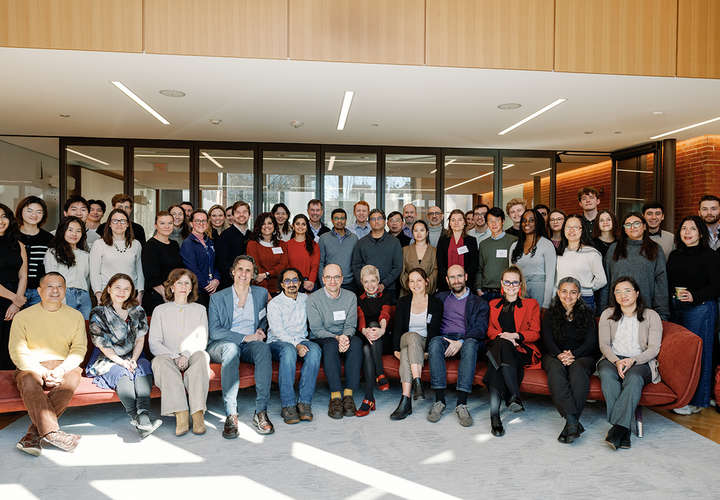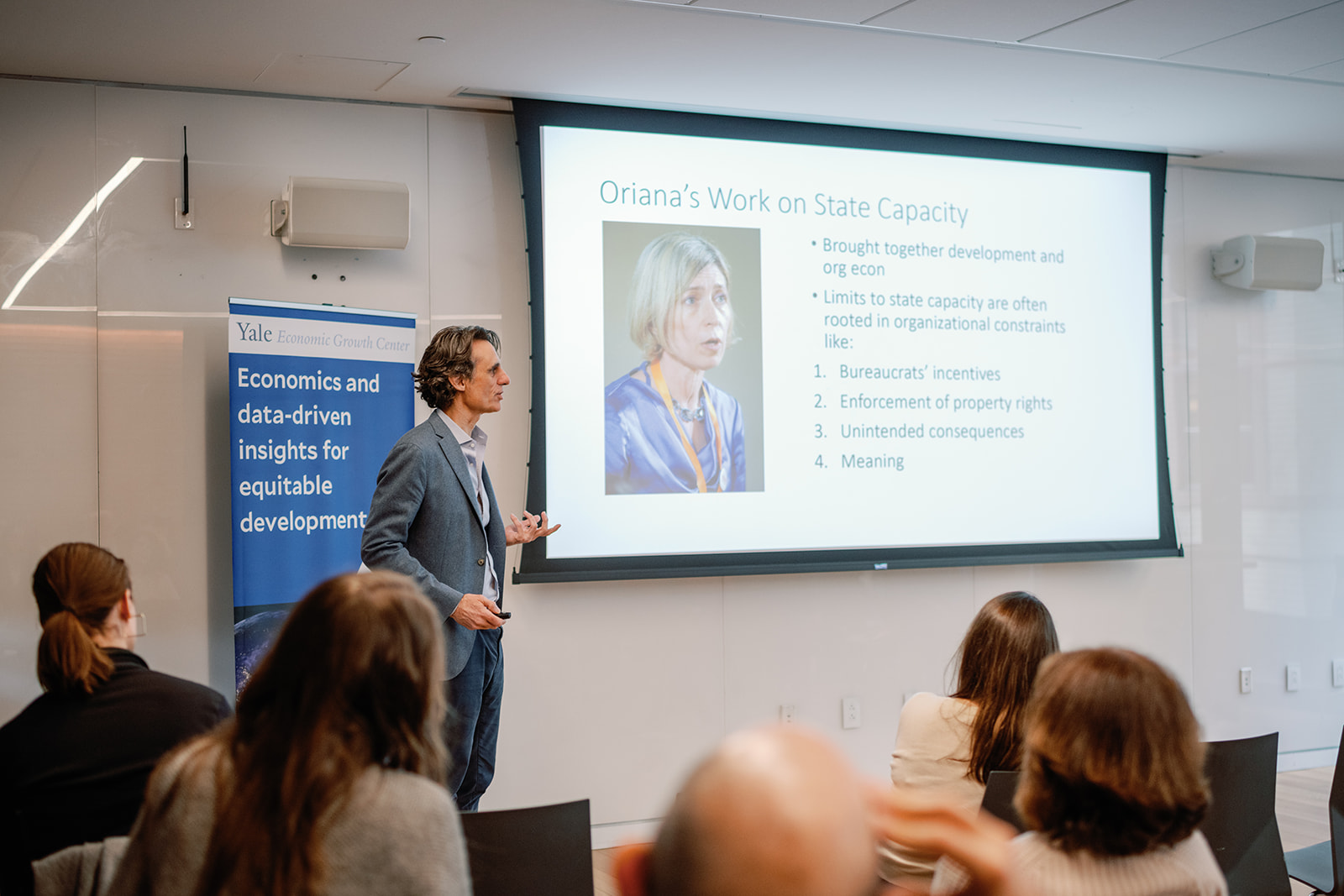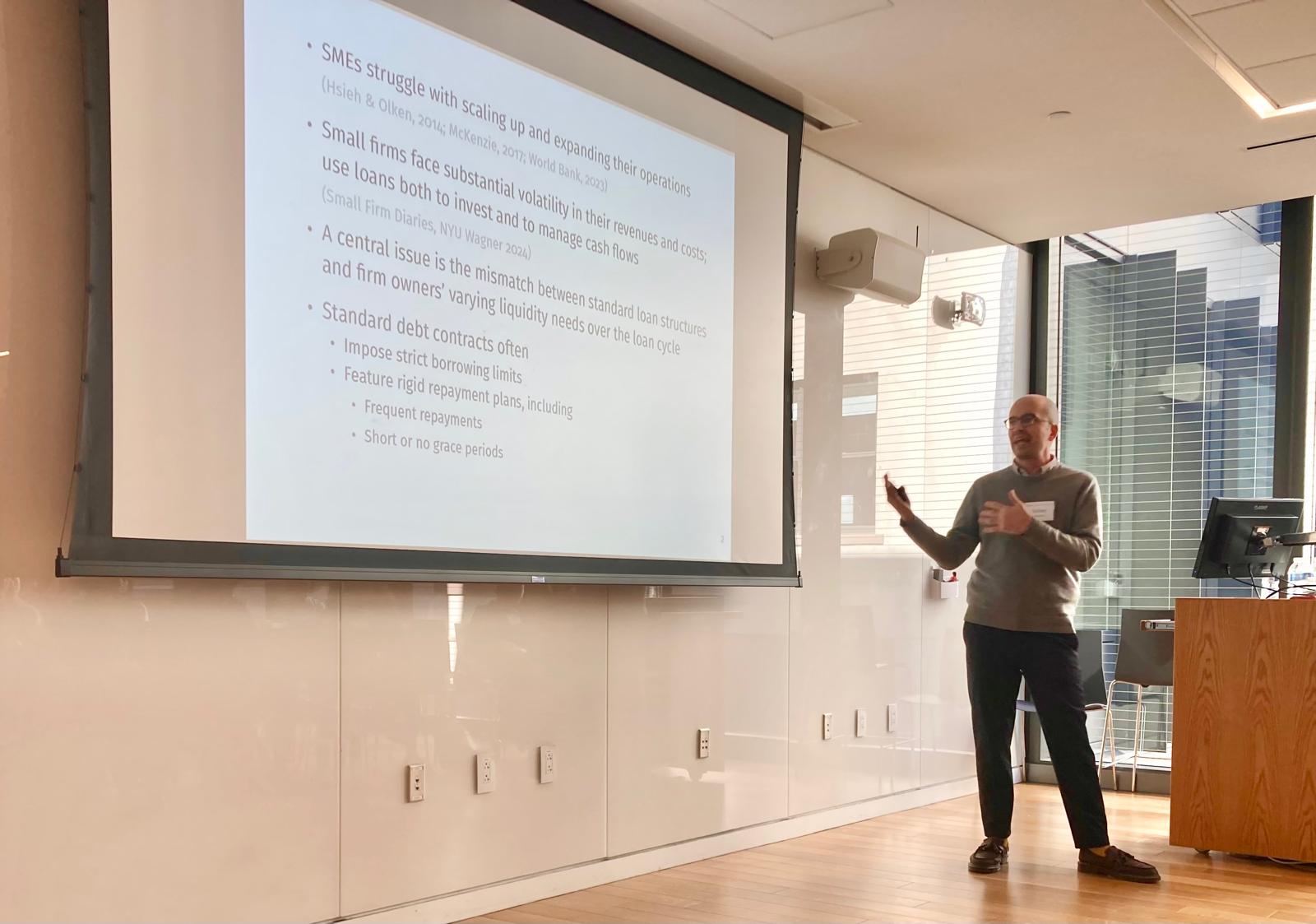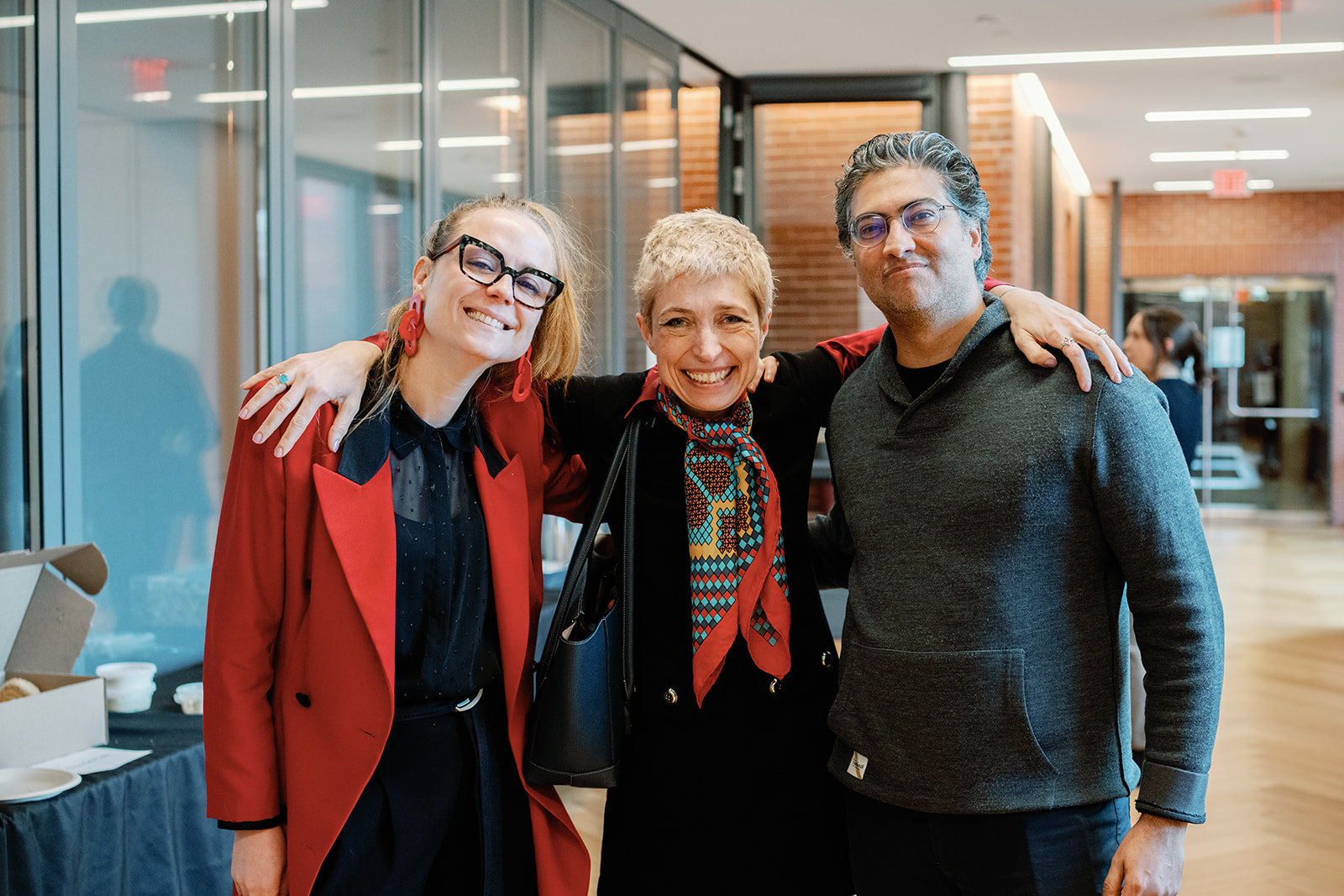Event Recap: Development and Organizations
On February 28, 2025, EGC hosted a mini-conference highlighting research from early- and mid-career scholars, building on themes from the 34th Kuznets Memorial Lecture, “Development and the Organization of Labor”, delivered by Oriana Bandiera. Co-organized by Erika Deserranno and Ameet Morjaria, the event celebrated Bandiera’s scholarship and teaching.

Organizations play an important role in the creation of value and in driving the prosperity of countries. They exist across all segments of the economy, including smallholder farmers, entrepreneurs, firms, government bodies, and large multinationals. Improving outcomes for vulnerable people worldwide depends on understanding and improving these organizations.
A significant challenge faced by these organizations is their ability to inclusively engage all productive segments of society in ways that create value and improve welfare. For example, although women have largely closed the education gap in recent decades, their expertise remains underutilized. At the same time, recent years have seen growing resistance to the inclusion of many productive groups within these organizations.
Against this backdrop, EGC hosted a mini conference to showcase the latest research in development and organizations. The 2025 Kuznets Mini-Conference, “Development and Organizations,” featured a series of sessions that explored topics ranging from gender attitudes within organizations to the digitization of tax collection. Researchers presented fresh insights from recent and ongoing studies on how organizational decisions affect productivity, market efficiency, and poverty reduction.
The event was co-organized by Erika Deserranno (Northwestern and Bocconi University) and Ameet Morjaria (Northwestern University), following the 34th Annual Kuznets Memorial Lecture, “Development and the Organization of Labor” delivered by Oriana Bandiera (London School of Economics).
Session 1: State Capacity
 Julia Luckett
Julia Luckett
Shan Aman-Rana presents her research on the effects of digitization of land records in Pakistan. at the 2025 Kuznets mini-conference.
Shan Aman-Rana (University of Virginia, and a former EGC visiting scholar) presented her research on the effects of digitization of land records in Pakistan. She shows that while digitization substantially decreased corruption rates, it had the unintended consequence of reducing the tax revenue collected by bureaucrats, who lost levers that could incentivize taxpayer compliance. Aman-Rana highlighted the fact that technology reforms must be combined with organizational reforms to replace lost social interactions and shift corruption monitoring.
Anders Jensen (Harvard University) presented research focused on local government organizations in Ghana, where only 27% of properties have assigned numbers and named streets. His work examined the impact of introducing GIS technology to locate properties in the tax collection process on tax capacity. He found that the use of GIS technology led to a 27% increase in bill deliveries and a 103% increase in tax collection. The study also revealed that within tax collection, workers respond to the introduction of enhanced technology by shifting their efforts to gathering information on taxpayers' capacity to pay rather than locating properties.
Guo Xu (University of California, Berkeley) presented research on the extent to which ideology (mis)alignment shapes policy and regulatory outcomes. He shared early-stage but already exciting results on the trade-off between expertise and political alignment in the rulemaking process.
The session concluded with a discussion by Andrea Prat (Columbia University), who connected the three papers to Oriana Bandiera’s significant body of work. He remarked:
"There is no one more important in development and organizational economics than Oriana, and no field more critical for development and organizational economics than state capacity." – Andrea Prat
 Julia Luckett
Julia Luckett
Andrea Prat speaks on Oriana Bandiera's work during his discussion of the first session at the 2025 Kuznets mini-conference.
Session 2: Labor Markets
 Julia Luckett
Julia Luckett
EGC postgraduate associates observe presentations during the 2025 Kuznets mini-conference.
Erika Deserranno (Northwestern University, Bocconi University, and a conference co-organizer) presented research on the effects of minimum wage increases on both male and female workers. She showed that in the U.S., as the minimum wage rises, men experience a greater improvement in welfare compared to women. Although income levels increase similarly for both men and women, the mechanisms behind these welfare differences vary: women increase their productivity in response to wage hikes, while men benefit from a direct, mechanical increase in wages. This disparity arises from the fact that women face worse outside options than men.
Kieu-Trang Nguyen (Northwestern University) used a worldwide administrative dataset, spanning 100 countries, from a multinational company to study the cultural transmission of gender norms through male expatriate managers. She found that managers from countries with more favorable norms toward women tend to instill these norms in the offices where they are posted. Importantly, the effects persist not only while the managers are in post but also after their departure. Her findings demonstrate that organizational culture can be changed with little to no turnover in staff.
Rohini Pande (L), Ilse Lindenlaub, and Ana Cecilia Fieler (R) converse during a break at the 2025 Kuznets mini-conference.
Ilse Lindenlaub (Yale University and an EGC affiliate) contributes to the labor misallocation literature in development economics. However, rather than looking at the misallocation of labor units, Lindenlaub looks specifically at worker-job match. She creates a measure of meritocracy across 28 countries by comparing the distance between the skills needed for a job and the skills of the workers in that job. With that measure she finds that meritocracy is higher in richer countries. However, she finds that closing the meritocracy gap would do little to close the productivity gap.
Session discussant Rocco Macchiavello (London School of Economics) had the difficult task of synthesizing insights from three substantial papers. He highlighted that while Lindenlaub answered a first order development question, Nguyen took an organizational angle, and Deserranno focused on the policy relevance, all the papers were rooted in Bandiera’s extensive body of work, which spans across these critical and interconnected areas.
Discussant Rocco Macchiavello connects the themes of the third session presentations at the 2025 Kuznets mini-conference.
Session 3: Credit and Poverty Traps
 Vestal McIntyre
Vestal McIntyre
Selim Gulesci explores liquidity mismatches and business growth during the 2025 Kuznets mini-conference.
Selim Gulesci (Trinity College Dublin) explores how liquidity mismatches over the loan cycle affect small firm growth and economic well-being. He shows the effect of upfront cash, dynamic repayment flexibility, early repayment flexibility, and small monthly rebates on investment and spending decisions. His study focuses on peri urban small and middle enterprises in Uganda, where household and business finances are often intertwined, especially for women who face social norms prioritizing household consumption over business growth.
Munshi Sulaiman (BRAC University) presented preliminary findings from a 17-year follow-up to a randomized control trial assessing the impact of BRAC Ultra Poor Graduation Initiative (BRAC UPGI), initiated by the NGO BRAC in Bangladesh in 2007. The program involved a large transfer of productive assets and technical skills training over two years. Sulaiman’s early-stage results suggest that the consumption gains achieved by the 2007 recipients have persisted into 2024. He also showed that recipients have longer lifespans.
Clare Balboni (London School of Economics) asks if anti-poverty programs can shield vulnerable populations from climate shocks, using the same program presented by Sulaiman, the BRAC UPGI. Her work combined satellite drought and flood measures with household panel data from Bangladesh to show that recipients of the graduation program were more resilient to shocks.
Session discussant Kelsey Jack (University of California, Berkeley) reflected on several cross-cutting themes in the previous three papers: the timing of interventions, the heterogeneity of impacts, and the persistence of treatment effects. She also emphasized the lasting influence of Bandiera’s work and approach through the BRAC UPGI. Following up on Bandiera’s lecture, Jack discussed that recipients of the graduation program were less likely to be pushed back down the poverty trap as a result of unexpected extreme weather shocks.
Session 4: Governance
Yanhui Wu explores the response of local governments to social media outcry during the 2025 Kuznets mini-conference.
Yanhui Wu (The University of Hong Kong) examines the impact of social media on government responsiveness in non-democracies. He uses large-scale social media responses to a vaccine scandal in March 2016 to show that Chinese local governments respond to public outcry in areas where authoritarian leaders and the public share common interests. Cities exposed to stronger social media shocks increased the share of more-transparent procurement and shifted procurement from small local suppliers to reputable nonlocal suppliers.
Ameet Morjaria (Northwestern University) presented new work on the impacts of product definition changes in a large marketplace. He discussed how understanding who benefits and who loses out from these changes requires understanding the political economy environment.
Session discussant Bob Gibbons (Massachusetts Institute of Technology) discussed these two papers with a bird’s-eye view of where they fit in the broad field of organizational economics. He suggests that these papers fit together neatly by showing that the visible hand is important and necessary at times.
 Julia Luckett
Julia Luckett
Bob Gibbons asks a question to a presenter during the 2025 Kuznets mini-conference.
A new opportunity for cross-field work on organizations
Bandiera’s Kuznets lecture began with a poignant statistic: 85% of the world’s population is represented in just 7% of the papers published in top-five economics journals, and fewer than 1% of the authors in these journals are based in the Global South (as documented by Amma Panin and David McKenzie). The lack of research on the regions that make up the majority of the world’s population means critical insights into how economies and organizations function in these areas are missing from the broader economic discourse. This gap is further compounded by ongoing research funding cuts, limiting the ability to generate insights from most of the world.
In her lecture, Bandiera emphasized the vast potential to address this imbalance through greater cross-pollination of ideas – not only between poorer and wealthier countries but also across different subfields of economics. The papers presented at this mini-conference were a step toward demonstrating that potential, linking insights from state capacity, labor economics, microfinance, social protection, and governance to deepen our understanding of how organizations – whether governmental, private, formal, or informal – function in diverse cultural, economic, and political contexts.
 Julia Luckett
Julia Luckett
Conference co-organizers Erika Deserranno (L) and Ameet Morjaria (R) pose with Oriana Bandiera at the 2025 Kuznets mini-conference, a celebration of Bandiera's scholarship and teaching.